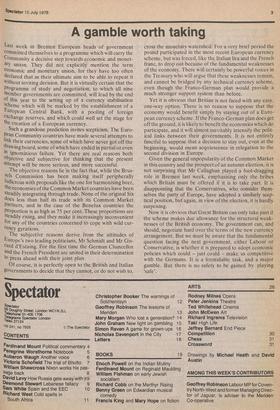A gamble worth taking
Last week in Bremen European heads of government committed themselves to a programme which will carry the Community a decisive step towards economic and monetary union. They did not explicitly mention the term economic and monetary union, for they have too often declared that as their ultimate aim to be able to repeat it Without inviting derision. But it is virtually certain that the Programme of study and negotiation, to which all nine member governments are committed, will lead by the end of this year to the setting up of a currency stabilisation scheme which will be marked by the establishment of a European Central Bank, with a pooling of foreign exchange reserves, and which could well set the stage for the creation of a European currency. Such a grandoise prediction invites scepticism. The European Community countries have made several attempts to link their currencies, some of which have never got off the (Yawing board, some of which have ended in partial or even in ignominious failure. Yet there are real reasons both Objective and subjective for thinking that the present • attempt will be more serious, and more successful.
The objective reasons lie in the fact that, while the Brussels Commission has been making itself peripherally ludicrous with proposals like the one for harmonising beer, the economies of the Common Market countries have been steadily integrating through trade. None of the original Six does less than half its trade with its Common Market Partners, and in the case of the Benelux countries the Proportion is as high as 75 per cent. These proportions are steadily rising, and they make it increasingly inconvenient for any of the countries concerned to cope with wild currency gyrations. The subjective reasons derive from the attitudes of Europe's two leading politicians, Mr Schmidt and Mr Gis card d'Estaing. For the first time the German Chancellor and the French President are united in their determination to press ahead with their joint plan.
Of course, it is perfectly open to the British and Italian governments to decide that they cannot, or do not wish to, cross the monetary watershed. For a very brief period the pound participated in the most recent European currency scheme, but was forced, like the Italian lira and the French franc, to drop out because of the fundamental weaknesses of the economy. There will certainly be powerful voices in the Treasury who will argue that these weaknesses remain, and cannot be bridged by any technical currency scheme, even though the Franco-German plan would provide a much stronger support system than before.
Yet it is obvious that Britian is not faced with any easy, one-way option. There is no reason to suppose that the economy would benefit simply by staying out of a European currency scheme. If the Franco-German plan does get off the ground, it is likely to benefit the economies which do participate, and it will almost inevitably intensify the political links between their governments. It is not entirely fanciful to suppose that a decision to stay out, even at the beginning, would mean acquiescence in relegation to the second division in Europe.
Given the general unpopularity of the Common Market in this country and the prospect of an autumn election, it is not surprising that Mr Callaghan played a foot-dragging role in Bremen last week, emphasising only the bribes which Britain must be offered if it is to take part. It is disappointing that the Conservatives, who consider themselves the party of Europe, have adopted a similarly sceptical position, but again, in view of the election, it is hardly surprising. '
Now it is obvious that Great Britain can only take part if the scheme makes due allowance for the structural weaknesses of the British economy. The government can, and should, negotiate hard over the terms of the new currency arrangement. But we must be aware that the fundamental question facing the next government, either Labour or Conservative, is whether it is prepared to adopt economic policies which could — just could — make us competitive with the Germans. It is a formidable task, and a major gamble. But there is no safety to be gained by playing 'safe'.


































 Previous page
Previous page